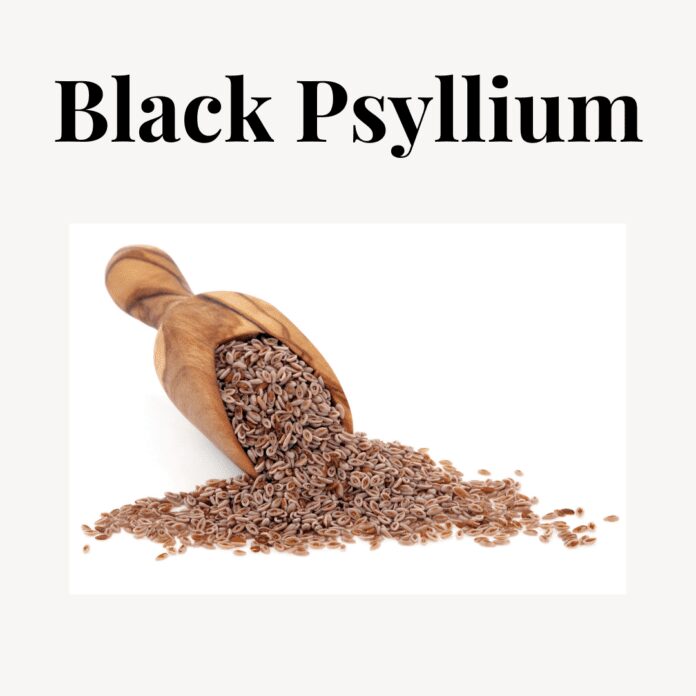Uses
Natural Medicines Comprehensive Database rates effectiveness based on scientific evidence according to the following scale: Effective, Likely Effective, Possibly Effective, Possibly Ineffective, Likely Ineffective, Ineffective, and Insufficient Evidence to Rate. The effectiveness ratings for BLACK PSYLLIUM are as follows:
Effective for…
- Constipation. Black psyllium is safe and effective for short-term, over-the-counter use for treating constipation.
Likely effective for…
- Heart disease. This is a soluble fiber. Foods high in soluble fiber can be used as part of a low-fat, low-cholesterol diet to prevent heart disease. Research shows that a person must eat at least 7 grams of psyllium husk each day to reduce the risk for heart disease.
Insufficient evidence to rate effectiveness for…
- Diabetes. Early research suggests that taking black psyllium might help control blood sugar in people with diabetes by reducing how quickly sugars are absorbed from food.
- High blood pressure. Research suggests that taking psyllium can decrease blood pressure in some people, but the effect is very small.
- Build-up of fat in the liver in people who drink little or no alcohol (nonalcoholic fatty liver disease or NAFLD). Early research shows that taking psyllium can lower body weight and body mass index (BMI) in people with NAFLD. But it doesn’t work any better than standard care.
- Obesity. Research suggests that psyllium does not reduce weight, body mass index (BMI), or waist measurement in people who are overweight or obese.
- A long-term disorder of the large intestine that causes stomach pain (irritable bowel syndrome or IBS).
- Cancer.
- Diarrhea.
- High levels of cholesterol or other fats (lipids) in the blood (hyperlipidemia).
- Other conditions.
More evidence is needed to rate the effectiveness for these uses.
Side Effects Of Black Psyllium
When taken by mouth: It is LIKELY SAFE for most people when taken with plenty of water. Drink at least 8 ounces of fluids for every 3-5 grams of husk or 7 grams of seed. Mild side effects include bloating and gas. In some people, black psyllium can cause allergic reactions such as a runny nose, red eyes, rash, and asthma, or, rarely, a life-threatening reaction called anaphylaxis.
Black psyllium is LIKELY UNSAFE when taken by mouth without enough water. Be sure to take it with plenty of water. Otherwise, it might cause choking or block the gastrointestinal (GI) tract.
Warnings & Precautions
- Pregnancy and breast-feeding: Taking black psyllium during pregnancy or breast-feeding seems to be LIKELY SAFE, as long as enough water is taken with the dose.
- Diabetes: Black psyllium can lower blood sugar levels in people with type 2 diabetes by slowing down the absorption of sugars from foods. Monitor blood glucose levels closely if you have diabetes and use it. Doses of your medications for diabetes may need to be adjusted.
- Intestinal problems: Don’t use black psyllium if you have impacted stools, a complication of constipation in which the stool hardens in the rectum and can’t be moved by usual movement of the bowel. Don’t use it if you have any condition that increases your risk of getting blockages in your intestines. The concern is that when black psyllium absorbs water and swells up, it might block the GI tract in people with these types of conditions.
- Allergies: Some people are severely allergic to black psyllium. This is more likely to happen to people who have been exposed to it on the job, such as nurses who prepare doses of powdered laxatives, or workers in factories that process psyllium. These people shouldn’t use black psyllium.
- Phenylketonuria: Some black psyllium products might be sweetened with aspartame (NutraSweet). If you have phenylketonuria, avoid these products.
- Surgery: Because black psyllium might affect blood sugar levels, there is a concern that it might interfere with blood sugar control during and after surgery. Stop using it at least 2 weeks before a scheduled surgery.
- Swallowing disorders: People who have trouble swallowing might be more likely to choke on black psyllium. If you have an esophageal problem or swallowing disorder, don’t use black psyllium.
Dosage Of Black Psyllium
It’s important to take enough water when taking black psyllium. Not taking enough fluid could lead to choking or obstruction of the gastrointestinal (GI) tract. Take at least 240 mL of fluid for every 5 grams of psyllium husk or 7 grams of psyllium seed. Black psyllium should be taken at least 30-60 minutes after taking other drugs.
The following doses have been studied in scientific research:
BY MOUTH:
- For constipation: The typical dose is 10-30 grams per day in divided amounts. Take each dose with plenty of water. Otherwise, black psyllium might cause choking. The FDA labeling recommends at least 8 ounces (a full glass) of water or other fluid with each dose.
- For heart disease: At least 7 grams of psyllium husk (soluble fiber) daily, as part of a low-fat, low-cholesterol diet.
Other
Consult your doctor or pharmacist.
Source
All information has been provided courtesy of MedLinePlus from the National Library of Medicine and from the FDA.



